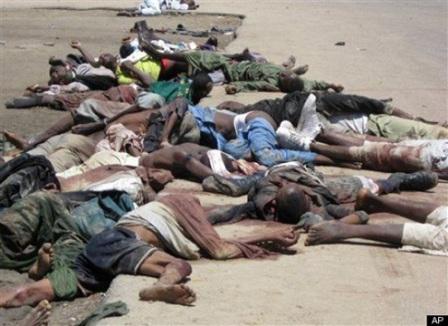Prior to the massacre that happened in the town of Baga, Borno State on the weekend of April 19th, 2013, caused by a clash between the Nigerian military and the Boko Haram Islamist sect, not many Nigerians outside the Borno and neighbouring states had heard about the town.
Baga, a town on the shores of the Lake Chad, has had its glory days before. It is situated in Kukawa Local Government Area of the state, which long ago was a capital of the legendary Kanem-Bornu Empire Mai Al-Kanemi.
It was also along one of the many Trans-Saharan trade routes, used to transport goods to and from the North African coast and Europe, and along with it, the interchange of cultures and religions. The Trans-Saharan trade peaked from the 8th century to the late 16th century. As trade between Europeans and the West African coast grew aided by better shipping, among other factors, the Trans-Saharan trade route declined. But the final blow to it was colonialism which created borders that caused disruption to the flow of trade. By the 1960s, the Trans-Saharan trade was all but dead.
The economy of Baga which had survived on the trade alongside fishing now had only the fishing to depend on, courtesy of the Lake Chad that was one of the world’s largest as at 1832, and Africa’s fourth largest at 26,000 square km in the 1960s. However, due to poor ecology management and over usage, the lake had shrunk to a mere 1,500 square km with an average depth of no more than 1.5m.
Naturally, this has in turn affected the fishing economy of the town that has supplied Nigeria with a lot of freshwater fish, mostly smoked and dried before being transported to other parts of the country.
In the midst of all this economic misfortunes, Baga as a town has remained undeveloped with no investment in its human capital through education, like most of Northern Nigeria. It has thus made the large population of young people in the town and the area be uneducated, devoid of economic opportunities, and thus, making them prone to being used in mindless violence, such as terrorism.
Terrorism, especially the religious kind, does not occur in a vacuum. Most times, it takes advantage of the hopelessness of a people by offering them false hope in the form of extremism, such as the one offered by Sheikh Mohammed Yusuf in starting his band of misfits, now known as Boko Haram, which led to many of the young men in the area joining.
Fast forward to 2013 and Baga is now world-(in)famous as the site of a massacre due to a clash between Islamic terrorists and a nation’s military. But rather than the terrorists suffering more losses, it ended being scores of civilians. Despite controversy over the actual number of victims, it can be fairly agreed that innocent civilians, indeed fell victim, as well as the terrorist sect drew its membership and to an extent, some support and cover from the area.
Amidst the outrage of the humans rights abuse, what few have failed to ask is how did we allow a town become so economically lost that its young men would find solace in the arms of religious extremism. To that, there is only one answer: crude oil.
The over-reliance of Nigeria on crude oil has led its governments at all levels to practically abandon all other sources of income for its people to depend on only one product.
If there was no oil, the Federal Government in general, and the Borno State government in particular, would have noticed that over time, that revenue from economic activities around the Lake Chad Basin was declining, since the state needs the revenue to survive. In return, it would have explored ways to improve the economic productivity of the area.
The government would have invested in education and infrastructure; developed policy to boost business; put the issue of the shrinking lake and the mismanagement of its ecology on the front-burner and do everything it can and should do to make sure that the state’s economy doesn’t nose-dive.
This would also have meant that the people in the area wouldn’t have been so economically helpless that its young people would be drawn into religious extremism to the point of being willing to give up their lives for a wrong cause.
It would also have meant that the military would not have any cause to invade the town with guns and tanks in search of terrorists. There would have been no civilian casualties, no deaths, no outrage.
However, this has not been so, because with oil money flowing in, virtually no state in Nigeria gets concerned about other sources of revenue. So long as there was enough money to pay salaries so that its civil servants did not revolt, they are fine.
This is but one of the many ways in which dependence on oil has caused disruption in our economy and society, and it is not peculiar to Baga, but it exists all over the country, in varying degrees.
It is one reason that it is about time that we weaned ourselves consciously off our dependence on oil, or else it would be done for us in a rather crude manner (no pun intended), especially now when we are unprepared for it.
We have paid a price enough for this overdependence.
We should not have to pay more.

